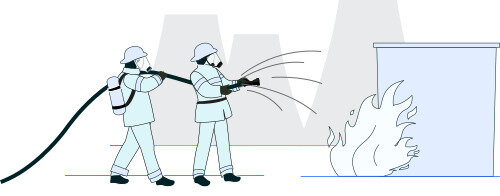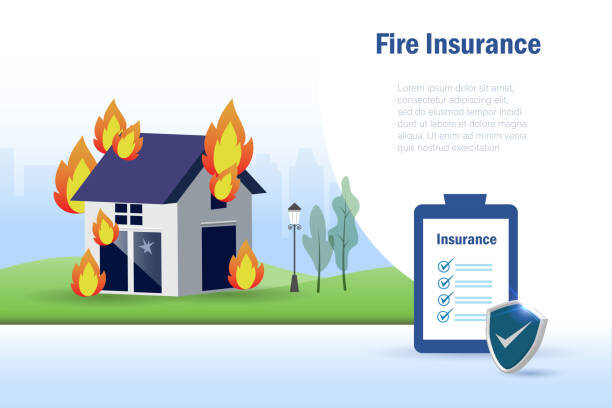
Before going into the details of property fire insurance and its limits and deductibles, it is necessary to understand what each of the terms stands for.
Deductibles
What is a Deductible
A deductible is the money you pay toward an insured loss. When a disaster such as a fire or an auto accident happens, the deductible is “deducted” from the claim paid by the insurer. In short, it is the risk that you share with the insuring company. Typically, the larger the deductible when taking out a policy, the lower will be the premium you pay on the insurance policy.
Deductibles are calculated either on a fixed amount dollar basis or a percentage of the claim. It is established at the time of buying the policy as per the terms you agree on. The deductible is mentioned on the front page of a homeowner’s insurance policy. How the deductibles are incorporated in the policy and the relevant language is strictly governed by laws that differ from state to state.
How Deductibles Work
As discussed, there are two ways to calculate deductibles – a fixed amount and a percentage of a claim.
In the specific amount category, suppose your policy puts your deductible at $500. Then, for a claim of $10000, you would be paid $9500 by your insurer. On the other hand, percentage deductibles apply only to homeowners’ policies and are calculated as a percentage of the insured value. Hence, if you have a 2% deductible on your house insured value of say $100,000, then $2000 would be deducted from the amount paid for every claim.
There are some exceptions to this rule though. In Louisiana and Florida, hurricane deductibles are allowed once per season instead of for every claim.
How to Save Money On Deductibles
You can save money on home insurance fire coverage by raising the deductible. Therefore, when buying a policy and shopping around for the best options, ask about the deductibles and compare them. Most homeowners offer a $500 or $1000 deductible and raising it even further can reduce the cost of the policy.
Keep in mind that at the end of the day for any claim, the deductible will go out from your pocket in case of a claim. Hence, to reduce the premium of fire insurance for your house, you should decide on a deductible amount that you are comfortable with.
What is Homeowners Insurance Fire Coverage
Fire insurance is a form of homeowners’ insurance that covers losses and damage from fire. Most standard homeowners’ policy has fire insurance for house sublimits but you can buy additional coverage for extra protection for your house.
Purchasing additional fire coverage has its benefits. For example, it covers the cost of repair or replacement and even reconstruction of the property above the sublimit set by the property insurance policy. However, there are certain exclusions for fire in a standard insurance policy such as war, nuclear risks, and fires that have been deliberately ignited.
How Home Insurance Fire Coverage Works
Any standard homeowner’s insurance policy includes fire insurance too. It provides coverage for loss or damage by fire to the home or possessions, also called insured property. This insured property clause in the policy includes both the exterior and interior of the house as well as any assets on the property.
A homeowners insurance fire coverage offers many beneficial protections. The policies cover injuries sustained by any person on the property. Further, if you have a mortgage, the lender will insist that you have a homeowners insurance policy even before a loan is sanctioned.
You can purchase fire insurance as a stand-alone policy too. The best home insurance for fire coverage covers loss or damage from several sources. These include fires caused by gas explosions, faulty wiring, lightning, and natural disasters. Burst and overflowing pipes and water tanks might also be covered under this policy.

Homeowners Insurance Fire Coverage Limits
A question that is often asked by homeowners is how much coverage do I need for fires. Our insurance experts and consultants at Just Livin Realty are invariably asked this question by those seeking homeowners fire insurance for the first time.
The only answer is that there is no one-hat-fits-all formula in this regard. Your limit is what your policy will reimburse you after a covered loss. Setting this limit is in your hands and you must fix it after considering the value of your home and belongings.
So, how do you go about fixing the limit of fire insurance for your house?
Choose the Ideal Personal Property Coverage
Increase the limits of your policy if you believe that you need more coverage to replace damaged belongings in the case of a fire. Some items like jewelry have lower coverage limits offered by insurers. In such cases, purchase additional fire coverage to protect those items.
Additionally, go through your policy to know whether it provides replacement cost coverage or actual cash value. In the first case, the insurers pay the replacement cost value which helps to purchase the item again at today’s value. On the other hand, in actual cash value, the depreciated value of the damaged items is reimbursed.
Choose A Limit For Dwelling Coverage
Before choosing a limit for the best home insurance for fire coverage, think of the cost of rebuilding your home after a fire. It may not be equal to the price you paid for the home in the first place because construction costs vary and generally go up every year. It is important to estimate first what might be the costs of repairing or reconstructing your home after a fire before fixing a limit for the fire insurance for your home.
Do you need more help in deciding the limits and deductibles for home insurance fire coverage? Call the insurance experts at Just Livin Realty and we will guide you on how to choose the best home insurance for fire coverage.

